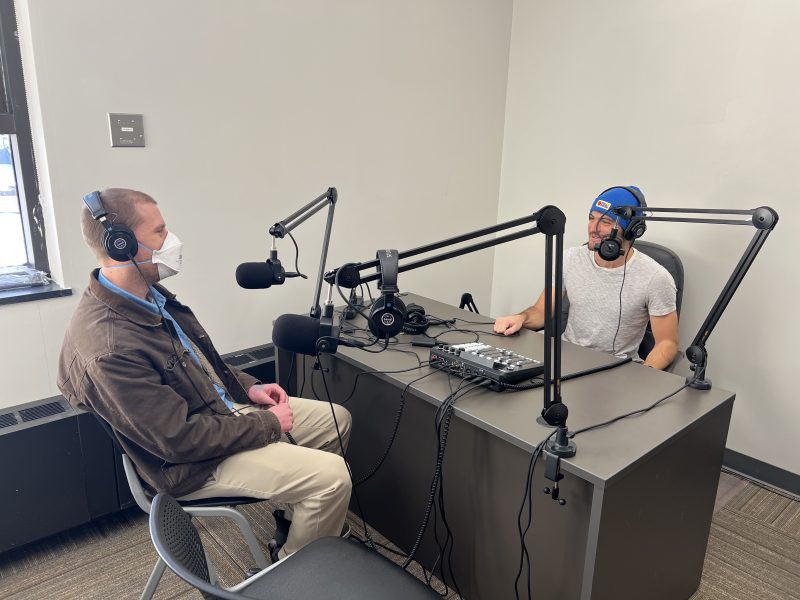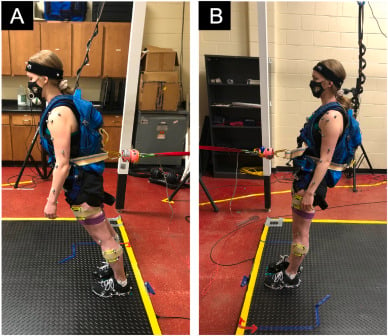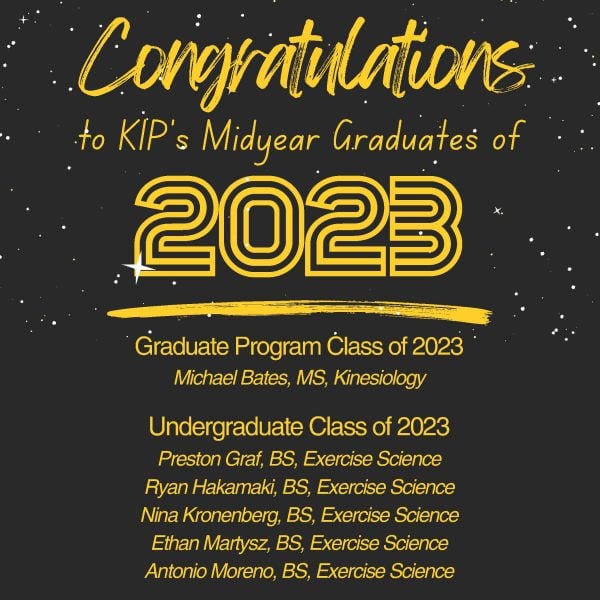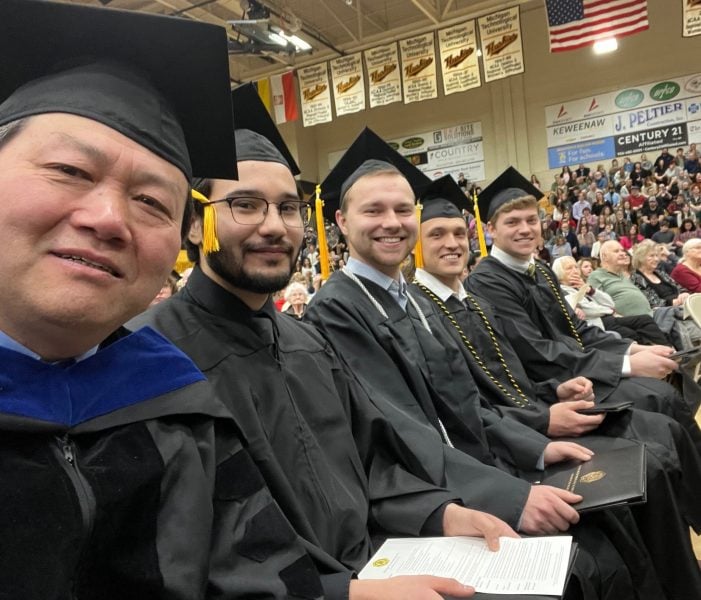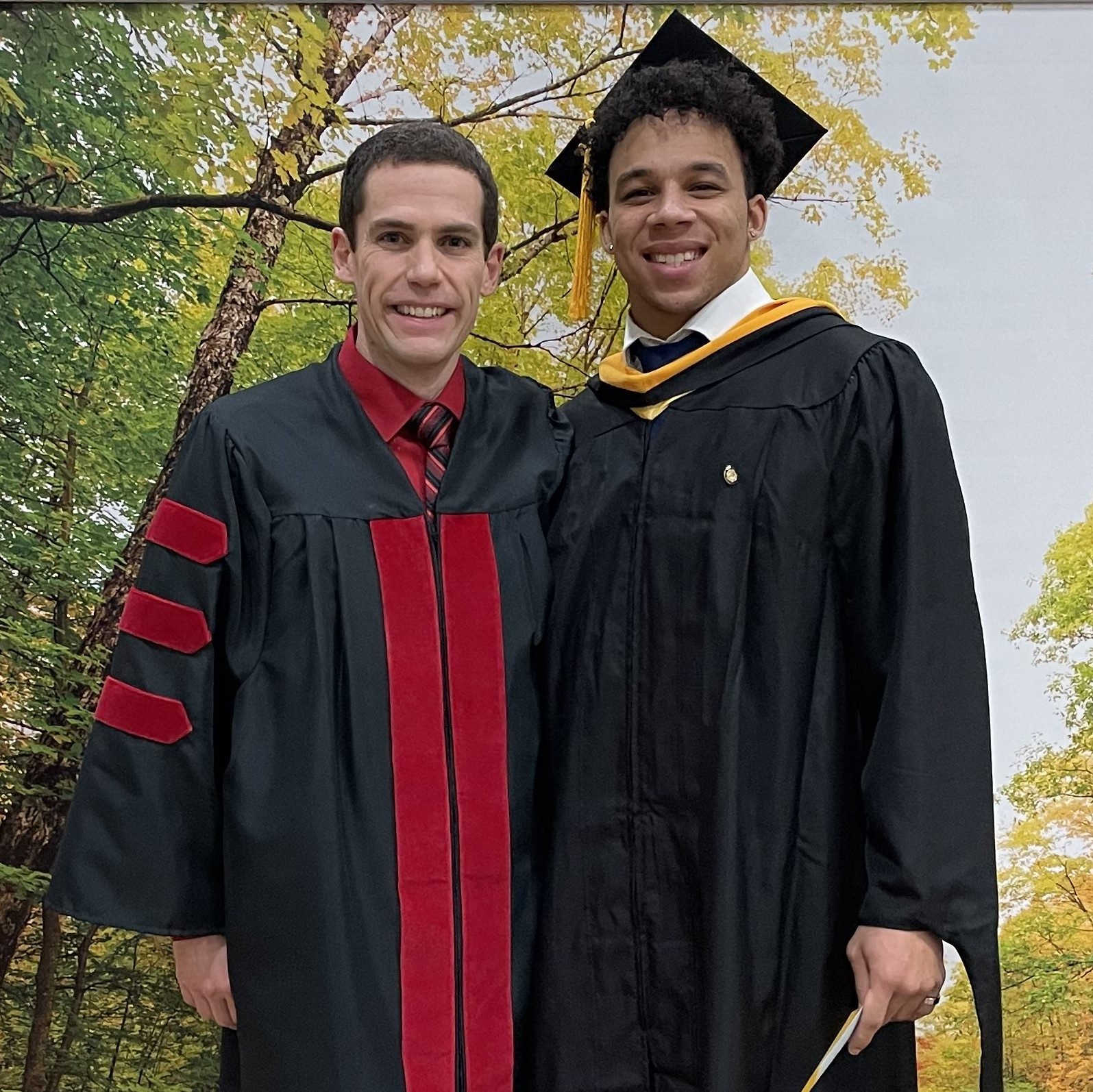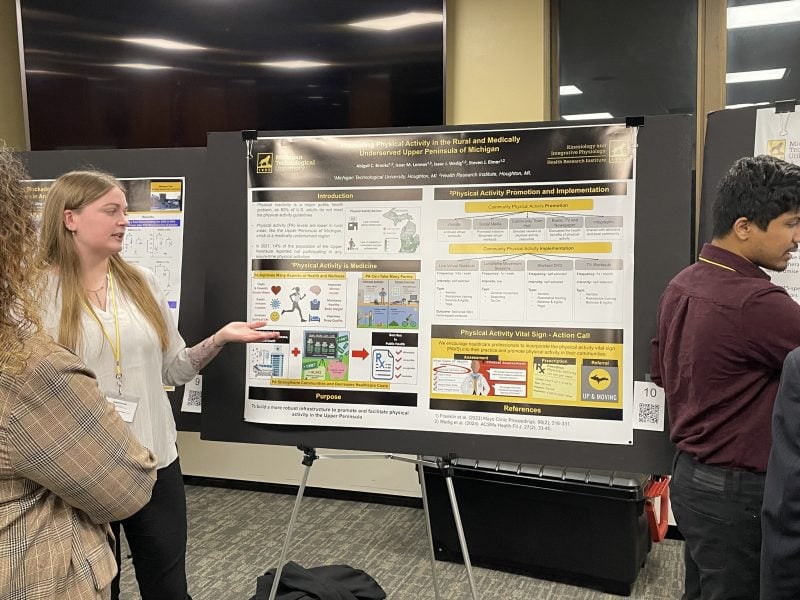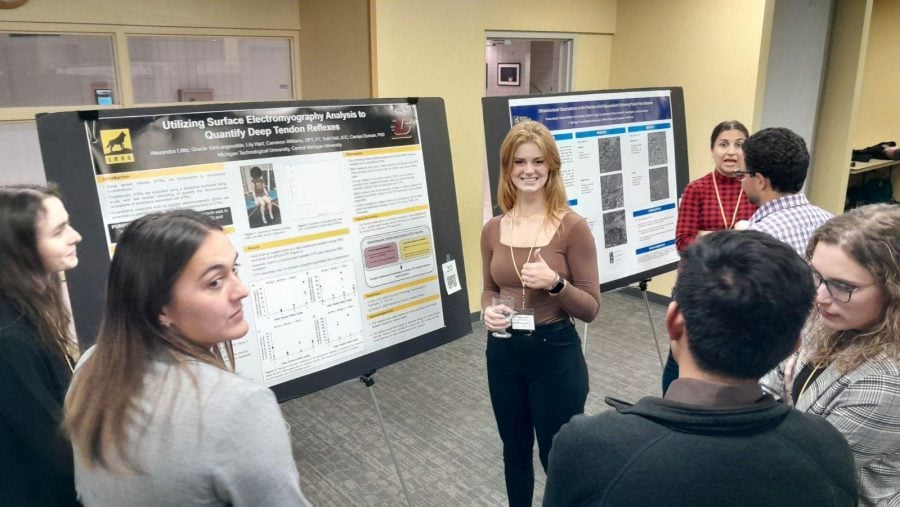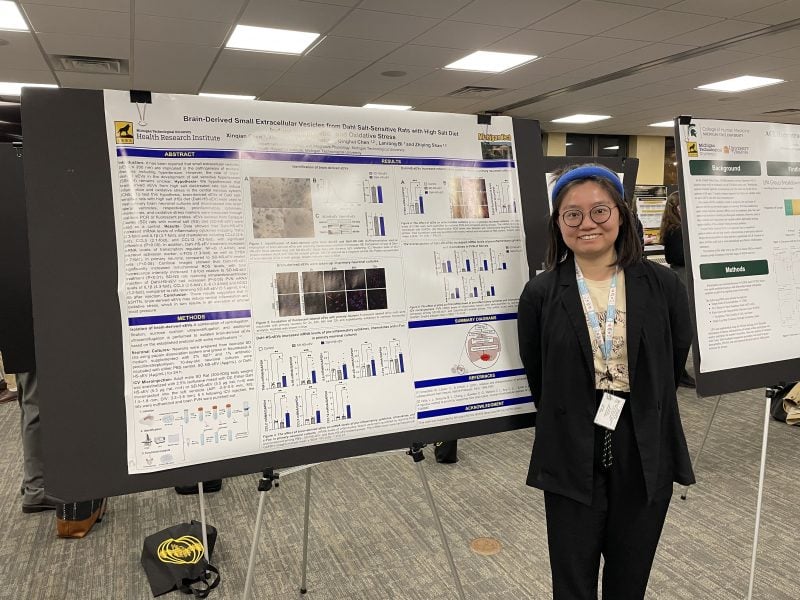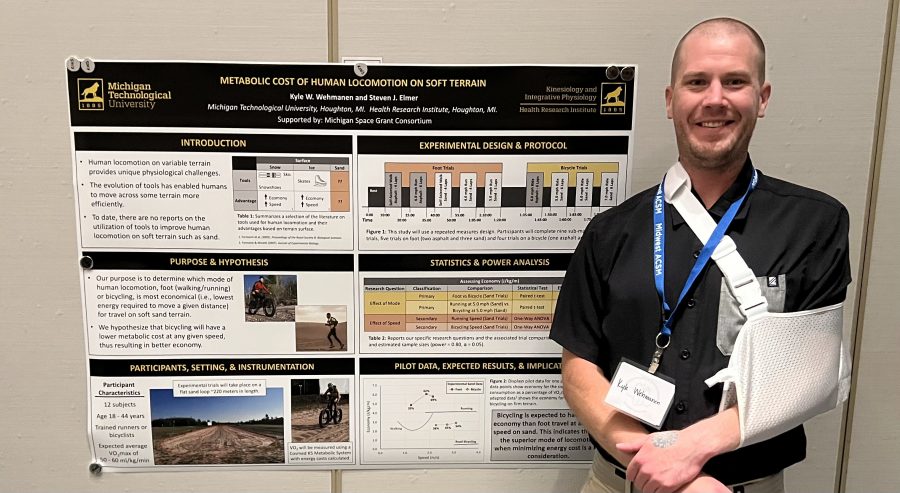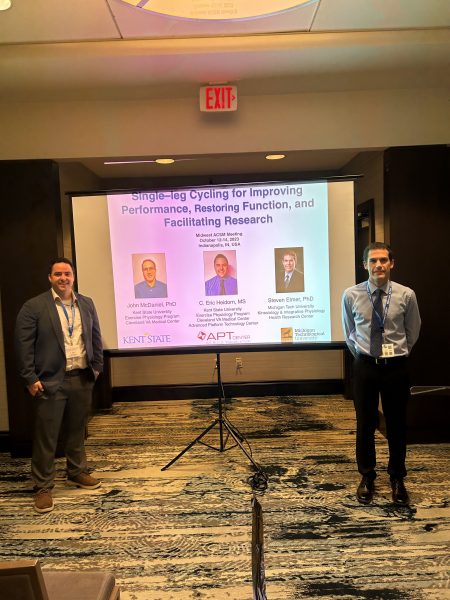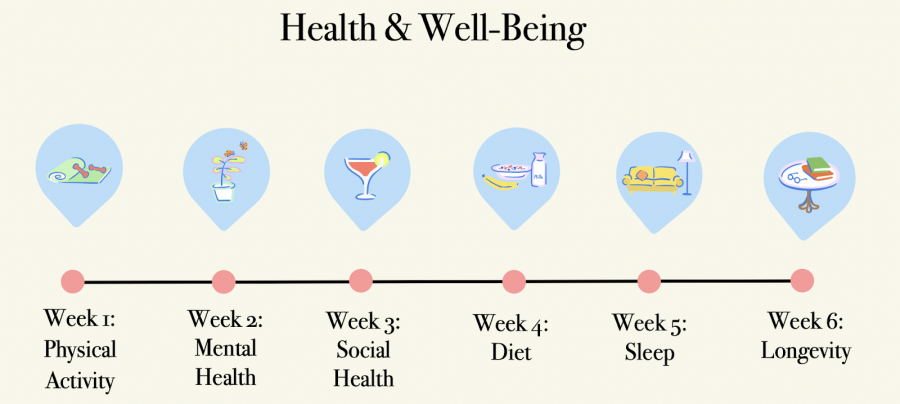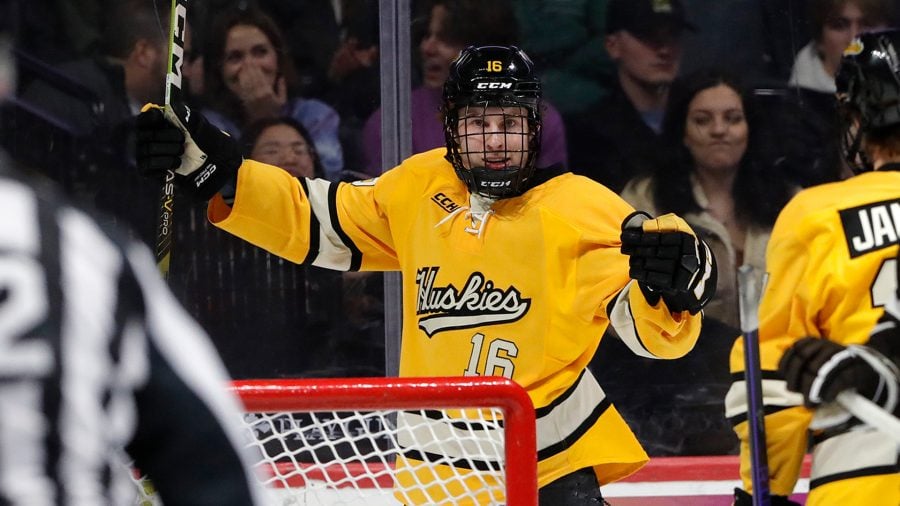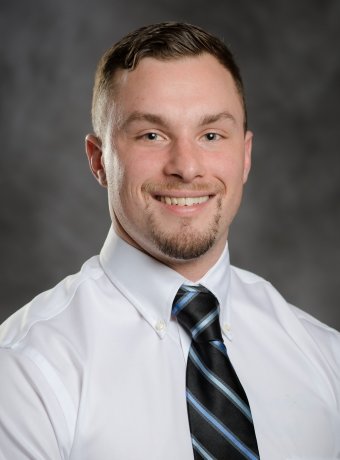Graduate students Kyle Wehmanen and Felix Cottet-Puinel discussed their recent publication in the Advances in Physiology Education titled “Impact of Health Behaviors on Community Well-Being and Resilience: Teaching K-12 Students with Jenga!” on the American Physiological Society (APS) Publications Podcast series. You can listen to the podcast on the APS Publications Podcast website.
Three departments at Michigan Tech collaborated on a research study titled “Influences of Backpack Loading on Recovery from Anterior and Posterior Losses of Balance.” The official release of the paper can be found in Applied Ergonomics.
Students from the Kinesiology and Integrative Physiology and Mechanical Engineering-Engineering Mechanics department at MTU and Central Michigan University’s Doctor of Physical Therapy program worked on this study under the direction of Dr. Carolyn Duncan (KIP faculty).
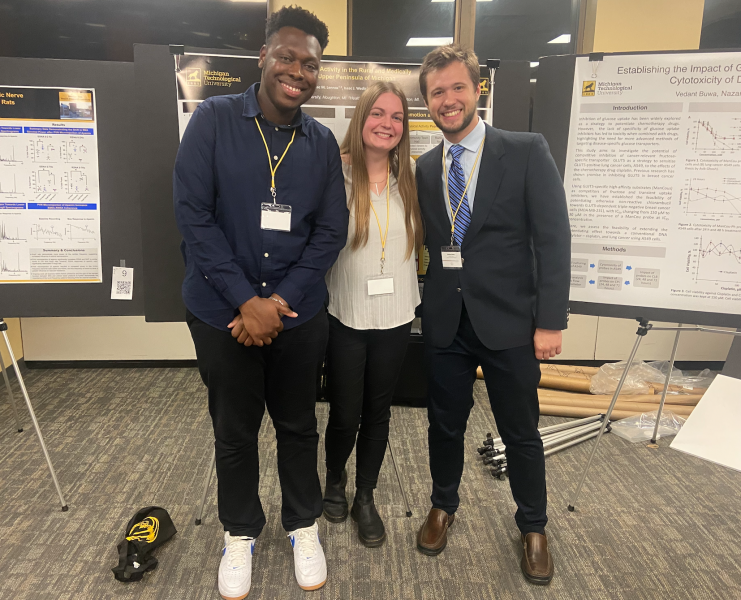
The 2023 Upper Peninsula Medical Conference was held on the MTU’s campus on October 28, 2023. Several KIP students attended to learn more about their field of study and network with health care professionals.
Abby Brooks is a first-year master’s student in Kinesiology. She is part of the Exercise Physiology Lab and advised by Dr. Steve Elmer. Something she found really interesting about the conference was the talk that involved red light and blue light. She had heard about blue light before and how it affects how you sleep, but she didn’t know how bad the effects actually were, and it made her think about how she should put her phone down earlier. She didn’t know the ideas presented about red light and its benefits. She also presented a poster on her research, titled “Promoting Physical Activity in the Rural and Medically Underserved Upper Peninsula.”
Lily Hart is a thesis-based master’s student in Kinesiology and a member of Dr. Carolyn Duncan’s Biomechanics Lab. Something she found interesting about the conference was the variety of professions that can be a part of the medical field other than being a physician. Also, it was her first time being a part of a conference and presenting, and she felt very grateful to be able to be there with the lab team.
Gracie VanLangevelde is pursuing an accelerated master’s degree in Kinesiology. She works in Dr. Duncan’s lab and focuses on deep tendon reflexes. Something she learned was that the ticks in the Upper Peninsula carry diseases other than Lyme disease. People can collect the ticks they find and submit them to the local lab for testing. The title of her poster presentation was “Utilizing Surface Electromyography and Kinematic Analyses to Quantify Deep Tendon Reflexes.” Gracie said, “I hope to contribute to this ongoing study to help other researchers with their work.”
Xinqian (Sherry) Chen has been studying for four years under Dr. Zhiying (Jenny) Shan to earn her PhD in Integrative Physiology. Something she learned from the conference was new mechanism of diabetes is focusing on the loss of beta cell identity (dedifferentiation or trans-differentiation) instead of the loss of beta cell numbers. Her poster presentation was titled “Brain-derived Small Extracellular Vesicles from Dahl Salt Sensitive Rats with High Salt Diet Induce Inflammation and Oxidative Stress.”
Nathan Balok is a first-year master’s student in Kinesiology. He is currently working in the Exercise Physiology Lab with Dr. Elmer. When he attended the UP Medical Conference, he found Dr. Jed Magen’s presentation about major depressive disorder in primary care settings particularly interesting. Since he hopes to enter the medical field as a physician, it will be crucial for him to be mindful of his patients’ health from a holistic point of view, including their mental health. Recognizing the signs and symptoms of major depressive disorder and taking the steps to treat it will help him be a better advocate for patients’ health in the future.
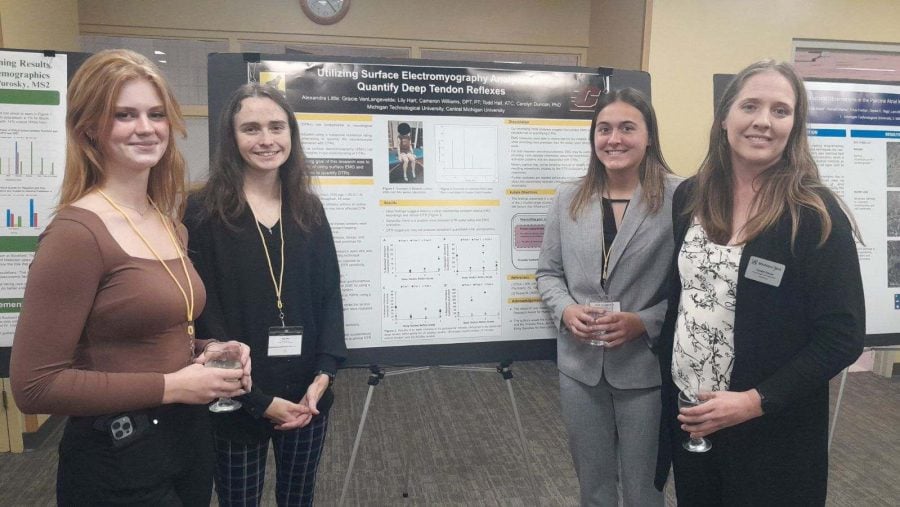
The research group that works in Dr. Carolyn Duncan’s Biomechanics Lab tied for 3rd place in the student poster competition. “My personal highlight of the conference was seeing the students interact with the healthcare professionals. The networking experience was awesome, and they seemed so excited that the work they were doing was of interest to people in the profession,” remarked Dr. Duncan. Learn more about the students’ research and work in the abstract below.
Utilizing Surface Electromyography and Kinematic Analyses to Quantify Deep Tendon Reflexes
Alexandra Little (BioSci), Gracie VanLangevelde (KIP), Lily Hart (KIP), Cameron Williams (CMU), Todd Hall (KIP), Carolyn Duncan (KIP)
Michigan Technological University, Central Michigan University
Deep tendon reflexes (DTRs) are a fundamental part of neurological examinations. Clinical observations and past studies have suggested that abnormal DTRs are a sign of corticospinal tract abnormalities or dysfunction with other descending pathways that influence the reflex arc. However, there are challenges regarding the interpretation and understanding of reflex excitability in clinical settings. There have been some attempts at using alternative methods, such as electromyography, to mechanically quantify DTRs for interpretation. However, this research has been limited to smaller focused studies and has not been used to examine and characterize DTRs across larger populations.
The overarching goal of the research is to characterize and quantify DTR responses using surface EMG and kinematic analyses. To accomplish this, our research team is currently performing 2 studies that aim to 1) Quantifying and determining the repeatability of DTR in healthy varsity athletes 2) Evaluating the relationship between neuromuscular output and DTR rating and 3) Examining the influence of concussions and contact sports on DTR response. In all studies surface EMG electrodes and inertial measurement units (IMU) are utilized to help quantify responses during standard quadriceps, achilles, biceps and triceps DTR testing. While this research is currently ongoing, initial findings suggest that surface electromyography and kinematic analyses can provide more precise information about DTR responses. Moving forward, these initial findings provide the foundational basis for future research examining DTR responses. This research also demonstrates the potential for utilizing EMG and kinematic analyses in clinical settings to gain more information about DTR responses.
Kyle Wehmanen and Dr. Steven Elmer from the Department of Kinesiology and Integrative Physiology traveled to Indianapolis, Indiana for the Midwest American College of Sports Medicine (ACSM) Annual Conference held on October 12-14, 2023. The conference brought together over 400 students, faculty, and professionals focused on kinesiology and sports medicine from across the Midwest states, including Michigan, Ohio, Indiana, Illinois, and Wisconsin.
This year was the 50th Midwest ACSM Annual Conference, which included a keynote presentation on “The Learning Connection: how physical activity, nutrition, free play and nurturing grow a healthy kid” by Anastasia Fischer, MD from Nationwide Children’s Hospital and The Ohio State University College. There were also 18 faculty and professional-led symposia, over 100 student oral and poster presentations, professional development sessions, and networking opportunities. To celebrate the Midwest chapter’s 50th anniversary, there was a historical presentation that highlighted how the chapter was started and how it has grown over the years to become what it is today.
Kyle Wehmanen, a second-year PhD student, presented a poster highlighting his research conducted in the Exercise Physiology Laboratory titled “Metabolic Cost of Human Locomotion on Soft Terrain.”
“Attending and presenting the MWACSM conference is a highlight for me every year. It always provides an inviting environment to share your research while gaining valuable feedback. It also provides a great opportunity to meet new like-minded individuals and have personal conversations with esteemed researchers in your areas of interest,” said Wehmanen.
Dr. Elmer presented as part of symposium that focused on “Single-Leg Cycling for Improving Performance, Restoring Function, and Facilitating Research” on day one of the conference and on “Science Communication and Advocacy: Current Topics and Integration with Your Career” on day two. The questions and feedback that Wehmanen and Elmer received will strengthen their projects and move their work forward. Overall, it was an excellent conference and professional development opportunity. A special thank you to the Michigan Space Grant Consortium and American Physiological Society for supporting the research and scholarly work that was presented by Wehmanen and Elmer. Also, thank you to members of the Exercise Physiology Laboratory and the Department of Kinesiology and Integrative Physiology for their continued support.
Background
Mental health and well-being is a well-documented concern in many settings, including school, work, and at home. Many individuals face depression, anxiety, eating disorders, substance abuse, and more. As graduate students in the Department of Kinesiology and Integrative Physiology, we believe that well-being is multifaceted and includes physical, mental, and emotional components. During his time in office, U.S. Surgeon General Dr. Vivek Murthy has raised several concerns related to mental health and well-being. Many of these relate to mental health. However, the U.S. Surgeon General seeks to remedy other concerns related to physical inactivity, health literacy, social media usage, and many other topics. A recent KIP blog post highlighted how the Surgeon General addresses the effects of loneliness and social isolation in individuals affecting overall health. Increased risk of dementia, cardiovascular disease, stroke, and mental illnesses are linked to increases in loneliness and social isolation. With guidance from the Surgeon General, these concerns will be addressed in this next series of blog posts. Our team read these advisory statements as a call to action, inspiring us to create a platform where our campus and community members can learn more about how to better their health and well-being.
Answering “The Call”
This series of blog posts will expand on the overarching theme of creating healthier habits and improving overall well-being, while also trying to promote health literacy by producing clear and concise information for all to view. The series will be broken down into six different posts that explore different aspects of health. These subsections will be defined as physical activity, mental health, social health, diet, sleep, and aging. Each segment will include an introduction to the topic, present relevant information and evidence, and provide simple recommendations that you can apply to your everyday life to improve your health and well-being. Our team is very passionate toward rural areas and rural health. This blog will aim to provide creative ways to improve the quality of life without the need for extensive resources. This blog will serve as a platform to share these ideas to improve our health and well-being in a comprehensive and accessible way. To complement this blog, information will be shared on the Michigan Tech KIP department’s social media pages (Facebook, Instagram, TikTok, and Youtube).
A Bit About Us and How We Want to Help You
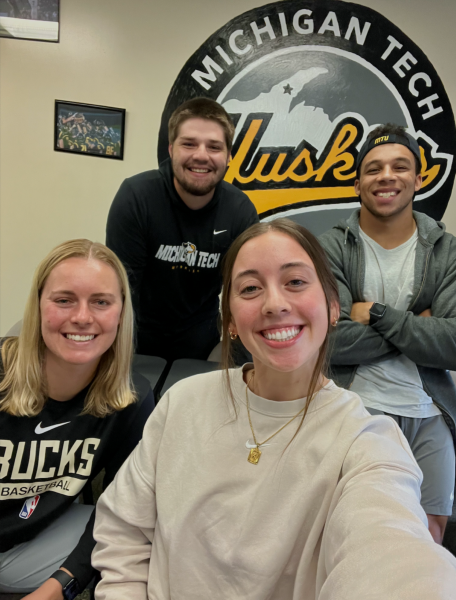
Our team consists of 4 Michigan Tech KIP Graduate Students. Kate Meister and Alex Rondorf are members of the Michigan Tech Women’s Basketball Team. Michael Bates and Blake Hewitt are members of the Tech Football Team. All of us are committed to ensuring a brighter future for a community we’ve been privileged to be a part of for the last several years. We all plan to pursue careers in healthcare/applied sports science and feel passionate about bringing you the latest and greatest information to ensure your overall well-being. We feel it’s important to advocate for a healthy lifestyle and want to present small steps that lead to big changes over time. This blog series will also help us refine our skills in science communication, which we are working on in Dr. Elmer’s KIP 5000 Advanced Exercise Physiology class this semester. Thank you for spending your time with us and we are excited to share our ideas and findings, as we embark on this journey to improve our health and well-being together.
Next Up
For the next post to be presented in this series, our first installment will provide an outlook on physical activity. We’ll talk about why physical activity is a necessary part of our daily lives, how much physical activity we really need, and how getting up and moving may actually save your life…
Kash Rasmussen , an Exercise Science student and a forward for the Michigan Tech hockey team, was named an All-American Scholar by the American Hockey Coaches Association (AHCA) for the 2022-23 academic year. Kash, who is a sophomore, had a 4.0 GPA in the fall and 3.78 in the spring to qualify for this recognition.
Read the complete press release on Michigan Tech Athletics’ website.
Guest blog by: Suma Durga Bommasani, College of Computing graduate student
Humans are social creatures as we are wired to interact and connect with others. However, over time we have become more isolated. Loneliness has become a serious public health concern that affects people of all ages, genders, and socioeconomic backgrounds in the United States. A new advisory report by the United States Surgeon General titled “Our Epidemic of Loneliness and Isolation” has shed light on the severity of this problem, showing that loneliness has a higher incidence rate than common medical conditions like smoking, obesity, and diabetes. Even though social isolation and loneliness have a considerable impact on individual health and society, only 20% of people consider it to be a serious problem.
As described in the report, about 1 in 2 adults experience loneliness. Loneliness has been linked to a higher risk of dementia, as well as cardiovascular disease, stroke, and mental health conditions. With a higher-than-average proportion of older individuals, this issue is of particular concern for the Upper Peninsula of Michigan region. Additionally, social isolation and loneliness among children and adolescents, which accelerated during the COVID-19 pandemic, increases the risk of anxiety and depression.
Experts highlight the critical need to implement strategies to build social interactions and boost health, safety, and well-being, as social ties are a fundamental human need. To address this serious issue, a national strategy with six main pillars has been presented, with the goal of building an integrated approach to improving community and social connectivity.
Individuals can prioritize their personal well-being by staying in touch with a varied network of people, limiting their use of social media, obtaining professional guidance when necessary, and expressing gratitude to others. The Centers for Disease Control and Prevention “How Right Now” platform provides some helpful resources for people currently experiencing loneliness. Parents and caregivers can positively affect the lives of children and adolescents by actively engaging with them, highlighting the value of social connections, and monitoring online activity. Getting assistance from mental health and medical professionals can also help with the behavioral alterations connected to loneliness. Educators can build in social connection content to health curricula and help to foster a sense of belonging in the classroom. Local organizations and businesses also play an important role in establishing social connection by introducing programs that increase social contact and bring community members together.
We can all contribute to strengthening social connections. This basic toolkit from the National Institutes of Health has some great examples for improving your social health. Even something as simple as reaching out to a friend, family member, or neighbor to say hi or to invite them for a short walk can help. By coming together to address social disconnection and loneliness, we can work towards building healthier and stronger communities.
Federal Resources
U.S. Department of Health and Human Services
Our Epidemic of Loneliness Social Isolation
https://www.hhs.gov/sites/default/files/surgeon-general-social-connection-advisory.pdf
Centers for Disease Control and Prevention
“How Right Now” platform
https://www.cdc.gov/howrightnow/emotion/loneliness/index.html
National Institutes of Health
Social Wellness Toolkit
https://www.nih.gov/health-information/social-wellness-toolkit
Campus Resources
Michigan Tech University Center for Student Mental Health
The Center for Student Mental Health and Well-being provides a wide array of resources for students to ensure mental and physical well-being.
National Resources
American Psychological Association (APA)
APA provides resources on workplace well-being, stress management, and mental health
American Association of Retired Persons (AARP)
AARP provides various resources for older adults, including information on social connection, loneliness, and community engagement
American Academy of Child & Adolescent Psychiatry (AACAP)
AACAP offers resources on children’s mental health, including loneliness and social isolation https://www.aacap.org
Local Resources
Upper Peninsula Commission for Area Progress (UPCAP)
UPCAP offers classes and workshops across the U.P. for disease prevention and management, and general wellness
Dr. Isaac Wedig, who earned his PhD in Integrative Physiology in Spring 2023, had his dissertation manuscript published by Frontiers in Physiology. The article is titled “Blood Flow Restriction as a Potential Therapy to Restore Physical Function Following COVID-19 Infection.” It was included as a part of a special Research Topic on “Intervention for Prevention, Management of and Rehabilitation from COVID-19.” Learn more about Isaac’s research by reading the introduction below or the full article on Frontiers in Physiology‘s website.
